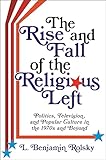The Rise and Fall of the Religious Left : Politics, Television, and Popular Culture in the 1970s and Beyond / L. Benjamin Rolsky.
Material type: TextSeries: Columbia Series on Religion and PoliticsPublisher: New York, NY : Columbia University Press, [2019]Copyright date: ©2019Description: 1 online resourceContent type:
TextSeries: Columbia Series on Religion and PoliticsPublisher: New York, NY : Columbia University Press, [2019]Copyright date: ©2019Description: 1 online resourceContent type: - 9780231193627
- 9780231550420
- Lear, Norman-Influence
- Liberalism (Religion) -- United States
- Liberalism (Religion)-United States
- Liberalism -- Religious aspects -- Christianity
- Liberalism-Religious aspects-Christianity
- Popular culture -- Religious aspects -- Christianity
- Popular culture -- United States -- History -- 20th century
- Popular culture-Religious aspects-Christianity
- Popular culture-United States-History-20th century
- Religious right
- RELIGION / Religion, Politics & State
- BR1615 .R65 2019
- online - DeGruyter
- Issued also in print.
| Item type | Current library | Call number | URL | Status | Notes | Barcode | |
|---|---|---|---|---|---|---|---|
 eBook
eBook
|
Biblioteca "Angelicum" Pont. Univ. S.Tommaso d'Aquino Nuvola online | online - DeGruyter (Browse shelf(Opens below)) | Online access | Not for loan (Accesso limitato) | Accesso per gli utenti autorizzati / Access for authorized users | (dgr)9780231550420 |
Frontmatter -- Contents -- Acknowledgments -- Introduction: Religious Liberalism, American Politics, and Public Life -- 1. Norman Lear, the Christian Right, and the Spiritual Politics of the Religious Left -- 2. All in the Family and the Spiritual Politicization of the American Sitcom -- 3. Norman Lear, the FCC, and the Holy War Over American Television -- 4. People for the American Way and Spiritual Politics in Late Twentieth- Century America -- 5. Liberalism as Variety Show: I Love Liberty and the Decline of the Religious Left -- Conclusion: Religion, Politics, and the Public Square-2019 -- Notes -- Bibliography -- Index
restricted access online access with authorization star
http://purl.org/coar/access_right/c_16ec
For decades now, Americans have believed that their country is deeply divided by "culture wars" waged between religious conservatives and secular liberals. In most instances, Protestant conservatives have been cast as the instigators of such warfare, while religious liberals have been largely ignored. In this book, L. Benjamin Rolsky examines the ways in which American liberalism has helped shape cultural conflict since the 1970s through the story of how television writer and producer Norman Lear galvanized the religious left into action.The creator of comedies such as All in the Family and Maude, Lear was spurred to found the liberal advocacy group People for the American Way in response to the rise of the religious right. Rolsky offers engaged readings of Lear's iconic sitcoms and published writings, considering them as an expression of what he calls the spiritual politics of the religious left. He shows how prime-time television became a focus of political dispute and demonstrates how Lear's emergence as an interfaith activist catalyzed ecumenical Protestants, Catholics, and Jews who were determined to push back against conservatism's ascent. Rolsky concludes that Lear's political involvement exemplified religious liberals' commitment to engaging politics on explicitly moral grounds in defense of what they saw as the public interest. An interdisciplinary analysis of the definitive cultural clashes of our fractious times, The Rise and Fall of the Religious Left foregrounds the foundational roles played by popular culture, television, and media in America's religious history.
Issued also in print.
Mode of access: Internet via World Wide Web.
In English.
Description based on online resource; title from PDF title page (publisher's Web site, viewed 02. Mrz 2022)


